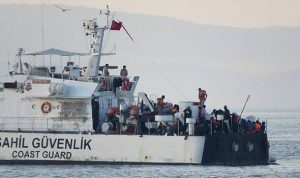Author: Valeria Hänsel
The Greek island of Lesvos is going through a period of strong protests. Across all political camps, the people on the island refuse to carry out the European policy measures which are transforming Lesvos into an open-air prison for refugees on the edge of Europe. Groups that are strongly divided by ideological convictions, including local left wing, moderate and right wing groups, refugees and international activists share one concern: They oppose the situation created by the EU-Turkey statement.
While right wing groups are driven by racist sentiments, the majority of protesters does not longer accept the dehumanizing living conditions in the European “Hotspot Camp” Moria. More than 6.000 people are forced to live in overcrowded containers or in small summer tents and are exposed to wind and weather without adequate protection. Some have been forced to live under these conditions for more than 18 months and six people have died in Moria during the last winter.
To make this situation visible and fight for freedom of movement, there have been several protests marches and refugees have occupied space on the central Sappho Square in Lesvos’ capital Mytilene for the whole of November. When the police evicted the square, they occupied the local office of the ruling party SYRIZA with the support of local antifascists.
Continue reading Lesvos Fights Against its Role as Europe’s “Open Air Prison”

